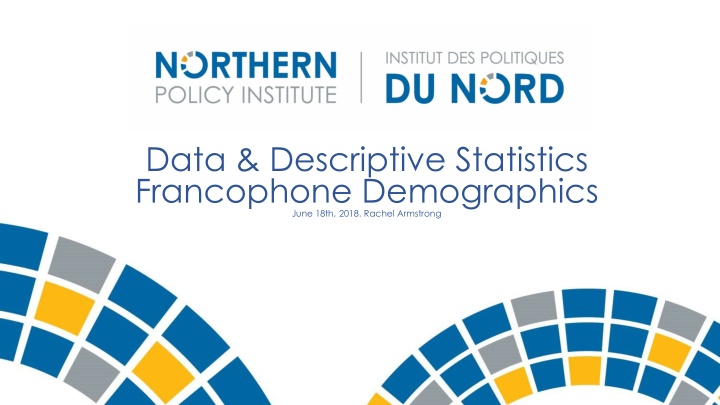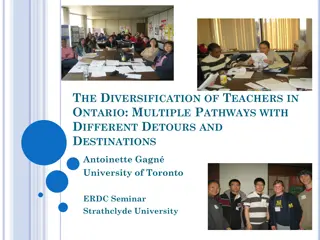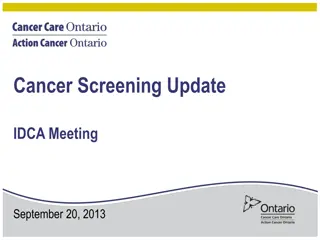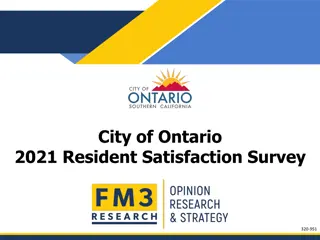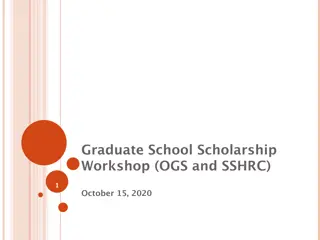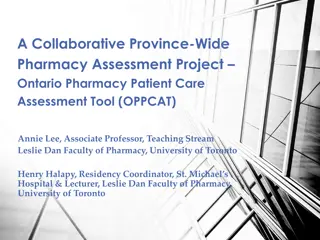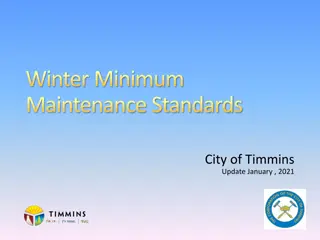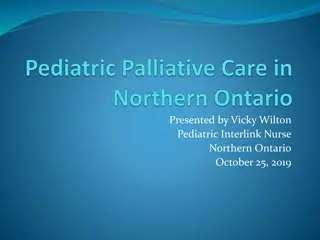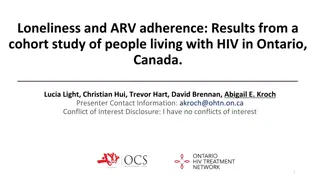Francophone Demographics in Ontario - June 18th, 2018
This presentation focuses on the data and descriptive statistics of Francophone demographics in different regions of Ontario as of June 18th, 2018. It includes information sourced from Statistics Canada, highlighting the population percentages of Francophones in Northern, Eastern, and Central-South-West Ontario. The data is subject to limitations and random rounding for confidentiality. Census districts within Francophone Immigration Support Networks are also discussed, providing insights into the distribution of the Francophone population across various regions.
Download Presentation

Please find below an Image/Link to download the presentation.
The content on the website is provided AS IS for your information and personal use only. It may not be sold, licensed, or shared on other websites without obtaining consent from the author.If you encounter any issues during the download, it is possible that the publisher has removed the file from their server.
You are allowed to download the files provided on this website for personal or commercial use, subject to the condition that they are used lawfully. All files are the property of their respective owners.
The content on the website is provided AS IS for your information and personal use only. It may not be sold, licensed, or shared on other websites without obtaining consent from the author.
E N D
Presentation Transcript
Data & Descriptive Statistics Francophone Demographics June 18th, 2018. Rachel Armstrong
Data & Descriptive Statistics: Disclaimer Data from Statistics Canada is used in this presentation. This data source has limitations. To ensure confidentiality of individual respondent identity and characteristics, Statistics Canada data is subject to non-disclosure rules. All estimates are subjected to a process called random rounding, which transforms all raw estimates to random rounded estimates. This reduces the possibility of identifying individuals within the tabulations. All estimates greater than 10 are rounded to base 5. Estimates less than 10 are rounded to base 10. The total value of summed or grouped data may not match the individual values. Similarly, percentages, which Statistics Canada calculates on rounded data, may not necessarily add up to 100 percent. Statistics Canada adjusts figures retroactively. Author s calculations are based on data available at the time of publication and are therefore subject to change. Statistics Canada data sources include: -Census Profile 2016, (Obtained through Statistics Canada) -Target group profile of the Francophone population, Census, 2016 (Obtained through the Community Data Program)
Census districts within Francophone Immigration Support Networks R seau de soutien l immigration francophone du Nord de l Ontario: R seau de soutien l'immigration francophone du Centre-Sud- Ouest de l'Ontario: R seau de soutien l immigration francophone:
Data & Descriptive Statistics Francophones make up: 17% of the population in Northern Ontario 16% of the population in Eastern Ontario 2% of the population in Central-South-West Source: Author's calculations based on Statistics Canada, Target group profile of the Francophone population, Census, 2016, and Authors calculations based on Statistics Canada, Census of Population, 2016
Data & Descriptive Statistics: Francophone % per census district R seau de soutien l immigration francophone du Nord de l Ontario: R seau de soutien l'immigration francophone du Centre-Sud- Ouest de l'Ontario: R seau de soutien l immigration francophone: Source: Author's calculations based on Statistics Canada, Target group profile of the Francophone population, Census, 2016, and Authors calculations based on Statistics Canada, Census of Population, 2016
Data & Descriptive Statistics: Targeted geographies Northern Ontario Francophones make up: 23%of Northeast Ontario ( Algoma, Sudbury, Cochrane, Timiskaming, Nippissing, Manitoulin & Parry Sound) 3%of Northwest Ontario (Kenora, Rainy River, Thunder Bay) Source: Author's calculations based on Statistics Canada, Target group profile of the Francophone population, Census, 2016, and Authors calculations based on Statistics Canada, Census of Population, 2016
Data & Descriptive Statistics: Targeted geographies Eastern Ontario Francophones make up: 19% of the population in Ottawa 4%of the population in Frontenac (Kingston CD) 42%of the population in SDGPR (Stormont Dundas and Glengarry, Prescott and Russell) Source: Author's calculations based on Statistics Canada, Target group profile of the Francophone population, Census, 2016, and Authors calculations based on Statistics Canada, Census of Population, 2016
Data & Descriptive Statistics: Targeted geographies C-S-W Ontario Francophones make up: 3% of the GTA ( Durham, Dufferin, Halton, Simcoe, Peel, York & Toronto) 2% of London-Sarnia (Middlesex & Lambton) 2% of Hamilton 4% of Niagra Source: Author's calculations based on Statistics Canada, Target group profile of the Francophone population, Census, 2016, and Authors calculations based on Statistics Canada, Census of Population, 2016
Data & Descriptive Statistics: Age - Ontario Source: Author's calculations based on Statistics Canada, Target group profile of the Francophone population, Census, 2016, and Authors calculations based on Statistics Canada, Census of Population, 2016
Data & Descriptive Statistics: Age - Northern Ontario Source: Author's calculations based on Statistics Canada, Target group profile of the Francophone population, Census, 2016, and Authors calculations based on Statistics Canada, Census of Population, 2016
Data & Descriptive Statistics: Age - Eastern Ontario Source: Author's calculations based on Statistics Canada, Target group profile of the Francophone population, Census, 2016, and Authors calculations based on Statistics Canada, Census of Population, 2016
Data & Descriptive Statistics: Age C-S-W Ontario Source: Author's calculations based on Statistics Canada, Target group profile of the Francophone population, Census, 2016, and Authors calculations based on Statistics Canada, Census of Population, 2016
Data & Descriptive Statistics: Education Ontario Source: Author's calculations based on Statistics Canada, Target group profile of the Francophone population, Census, 2016, and Authors calculations based on Statistics Canada, Census of Population, 2016
Data & Descriptive Statistics: Education Northeast Ontario Source: Author's calculations based on Statistics Canada, Target group profile of the Francophone population, Census, 2016, and Authors calculations based on Statistics Canada, Census of Population, 2016
Data & Descriptive Statistics: Education Northwest Ontario Source: Author's calculations based on Statistics Canada, Target group profile of the Francophone population, Census, 2016, and Authors calculations based on Statistics Canada, Census of Population, 2016
Data & Descriptive Statistics: Education Eastern Ontario Source: Author's calculations based on Statistics Canada, Target group profile of the Francophone population, Census, 2016, and Authors calculations based on Statistics Canada, Census of Population, 2016
Data & Descriptive Statistics: Education C-S-W Ontario Source: Author's calculations based on Statistics Canada, Target group profile of the Francophone population, Census, 2016, and Authors calculations based on Statistics Canada, Census of Population, 2016
Data & Descriptive Statistics: Immigration Source: Author's calculations based on Statistics Canada, Target group profile of the Francophone population, Census, 2016, and Authors calculations based on Statistics Canada, Census of Population, 2016
Data & Descriptive Statistics: Immigration 48% of Francophone immigrants in Ontario immigrated before 2001 Source: Author's calculations based on Statistics Canada, Target group profile of the Francophone population, Census, 2016, and Authors calculations based on Statistics Canada, Census of Population, 2016
Data & Descriptive Statistics: Immigration 62% of Francophone immigrants in Northern Ontario immigrated before 2001 Source: Author's calculations based on Statistics Canada, Target group profile of the Francophone population, Census, 2016, and Authors calculations based on Statistics Canada, Census of Population, 2016
Data & Descriptive Statistics: Immigration A total of 600 Francophone Immigrants have settled in the North since 2001 Source: Author's calculations based on Statistics Canada, Target group profile of the Francophone population, Census, 2016, and Authors calculations based on Statistics Canada, Census of Population, 2016
Data & Descriptive Statistics: Immigration There are a total of 230 Francophones classified as recent immigrants* in Northern Ontario. *Recent immigrants are those who settled less than 5 years before the time of the census. Source: Author's calculations based on Statistics Canada, Target group profile of the Francophone population, Census, 2016, and Authors calculations based on Statistics Canada, Census of Population, 2016
Data & Descriptive Statistics: Immigration 50% of Francophone immigrants in Eastern Ontario immigrated before 2001 Source: Author's calculations based on Statistics Canada, Target group profile of the Francophone population, Census, 2016, and Authors calculations based on Statistics Canada, Census of Population, 2016
Data & Descriptive Statistics: Immigration There are a total of 5915 Francophones classified as recent immigrants in Eastern Ontario. Source: Author's calculations based on Statistics Canada, Target group profile of the Francophone population, Census, 2016, and Authors calculations based on Statistics Canada, Census of Population, 2016
Data & Descriptive Statistics: Immigration 47% of Francophone immigrants in C-S-W Ontario immigrated before 2001 Source: Author's calculations based on Statistics Canada, Target group profile of the Francophone population, Census, 2016, and Authors calculations based on Statistics Canada, Census of Population, 2016
Data & Descriptive Statistics: Immigration There are a total of 14570 Francophones classified as recent immigrants in C-S-W Ontario. Source: Author's calculations based on Statistics Canada, Target group profile of the Francophone population, Census, 2016, and Authors calculations based on Statistics Canada, Census of Population, 2016
Data & Descriptive Statistics: Immigrant country of origin Source: Author's calculations based on Statistics Canada, Target group profile of the Francophone population, Census, 2016, and Authors calculations based on Statistics Canada, Census of Population, 2016
Data & Descriptive Statistics: Immigrant country of origin Source: Author's calculations based on Statistics Canada, Target group profile of the Francophone population, Census, 2016, and Authors calculations based on Statistics Canada, Census of Population, 2016
Data & Descriptive Statistics: Immigrant country of origin Source: Author's calculations based on Statistics Canada, Target group profile of the Francophone population, Census, 2016, and Authors calculations based on Statistics Canada, Census of Population, 2016
Data & Descriptive Statistics: Immigration admission category Economic Immigrant subcategory: Source: Author's calculations based on Statistics Canada, Target group profile of the Francophone population, Census, 2016, and Authors calculations based on Statistics Canada, Census of Population, 2016
Data & Descriptive Statistics: Immigration admission category Economic Immigrant subcategory: Source: Author's calculations based on Statistics Canada, Target group profile of the Francophone population, Census, 2016, and Authors calculations based on Statistics Canada, Census of Population, 2016
Data & Descriptive Statistics: Immigration admission category Economic Immigrant subcategory: Source: Author's calculations based on Statistics Canada, Target group profile of the Francophone population, Census, 2016, and Authors calculations based on Statistics Canada, Census of Population, 2016
Labour Market Analysis: Capacity to Identify Francophone Jobs Talent Neuron software: Used for identifying job postings by NOC & specified geography Used as a proxy or sample for demand Available through Local Employment Planning Councils/ Workforce Development Boards Can search for terms within job postings such as French & Bilingual Barriers: Does not include Indeed for legal reasons Cannot identify jobs in which no English is required
Labour Market Analysis: Unemployment Source: Author's calculations based on Statistics Canada, Target group profile of the Francophone population, Census, 2016, and Authors calculations based on Statistics Canada, Census of Population, 2016
Labour Market Analysis: Ontario Summary Total of 22 348 French speaking job postings found in Ontario 2017 Source: Author calculations based on LMI report prepared for NPI by A. Bell of the Workforce Development Board (Peterborough)
Labour Market Analysis: Northern Ontario Summary Total of 674 French speaking job postings found in Northern Ontario 2017, representing 3% of all job postings in this region. 70% found in the Northeast 30% found in the Northwest Source: Author s calculations based on LMI report prepared for NPI by A. Bell of the Workforce Development Board (Peterborough)
Labour Market Analysis: Eastern Ontario Summary Total of 5640 French speaking job postings found in Eastern Ontario 2017, representing 7% of all job postings in this region. Source: Author s calculations based on LMI report prepared for NPI by A. Bell of the Workforce Development Board (Peterborough)
Labour Market Analysis: C-S-W Ontario Summary Total of 16 034 French speaking job postings found in C-S-W Ontario 2017, representing 3% of all job postings in this region. Source: Author s calculations based on LMI report prepared for NPI by A. Bell of the Workforce Development Board (Peterborough)
Labour Market Analysis: Proxy for Demand per region Source: Statistics Canada, Target group profile of the Francophone population, Census, 2016, and LMI report prepared for NPI by A. Bell of the Workforce Development Board (Peterborough)
Labour Market Analysis: Who is working in French? Source: Author's calculations based on Statistics Canada, Target group profile of the Francophone population, Census, 2016, and Authors calculations based on Statistics Canada, Census of Population, 2016
Labour Market Analysis: Occupation demand per region UNIQUE TO THE NORTH: 7% of the total demand for francophone workers in Northern Ontario is in the occupation Industrial & Manufacturing Engineers (NOC 2141), compared to <0.5% in the East and C-S-W The occupation with the highest total demand for francophone workers in the North is, Other customer and information services representatives (NOC 6552), at 26% compared to 22% in the C-S-W & 11% in the East Northern Ontario The occupation with the second highest total demand for francophone workers in the North is, Retail salespersons (NOC 6421), at 12% , compared to11% in the C-S-W & 7% in the East This occupation represents the highest total demand in all 3 regions Source: Author s calculations based on LMI report prepared for NPI by A. Bell of the Workforce Development Board (Peterborough)
Labour Market Analysis: Occupation demand per region The occupation with the second highest total demand for francophone workers in the East is, Social and community service workers (NOC 4212), at9%, compared to 2% in the North and CSW respectively East UNIQUE TO THE EAST: The occupation with the third highest total demand for francophone workers in the East is, Customer and information services supervisors,(NOC 6314) at 8%, compared to <0.5% in the North and CSW respectively The occupation with the fourth highest total demand is Bus drivers, subway operators and other transit operators (NOC 7152) at 5%, compared to <0.5% in the North and CSW respectively Source: Author s calculations based on LMI report prepared for NPI by A. Bell of the Workforce Development Board (Peterborough)
Labour Market Analysis: Occupation demand per region The occupation with the second highest total demand for francophone workers in the CSW is Retail salespersons, (NOC 6421) at 11% UNIQUE TO THE C-S-W: The occupation with the third highest total demand for francophone workers in the C-S-W is, Advertising, marketing and public relations managers,(NOC 0124) at 4%, compared to 1% in the North and East respectively Source: Author s calculations based on LMI report prepared for NPI by A. Bell of the Workforce Development Board (Peterborough)
Labour Market Analysis: Industry analysis % of Jobs postings per region within industries with a high average fraction of demand for French speakers in all 3 regions: Industry Business Support Services Depository Credit Intermediation General Medical and Surgical Hospitals Home Health Care Services Individual and Family Services Management of Companies and Enterprises Management, Scientific, and Technical Consulting Services Other Telecommunications East 1% 7% 1% 9% 1% 3% 2% 3% North 2% 3% 5% 1% 4% 7% 4% 5% C-S-W 3% 4% 2% 2% 1% 3% 2% 7% Source: LMI report prepared for NPI by A. Bell of the Workforce Development Board (Peterborough)
Labour Market Analysis: Industry analysis Northern Ontario: Unique to the North 10% of french speaking job postings in the North are in the Sawmill and Wood Preservation Industry 3% of french speaking job postings in the North are in the Specialty Food Stores Industry 2% of french speaking job postings in the North are in the Pulp, Paper, and Paperboard Mills Industry 2% of French speaking job postings in the North are in the Investigation and Security Services Industry Source: LMI report prepared for NPI by A. Bell of the Workforce Development Board (Peterborough)
Labour Market Analysis: Industry analysis Eastern Ontario: Unique to the East 5% of french speaking job postings in the East are in the School and Employee Bus Transportation Industry 5% of french speaking job postings in the East are in the Othe Schools and Instruction Industry 3% of french speaking job postings in the East are in the Offices of Physicians Industry Source: LMI report prepared for NPI by A. Bell of the Workforce Development Board (Peterborough)
Labour Market Analysis: Industry analysis C-S-W Ontario: Unique to the C-S-W 3% of french speaking job postings in the C-S-W are in the Other Professional, Scientific, and Technical Industry 2% of french speaking job postings in the C-S-W are in the Electronic and Appliance Stores Industry 2% of french speaking job postings in the C-S-W are in the Insurance Carriers Industry 2% of french speaking job postings in the C-S-W are in the Pipeline Transportation of Natural Gas Industry 2% of french speaking job postings in the C-S-W are in the Social Advocacy Organziations Industry Source: LMI report prepared for NPI by A. Bell of the Workforce Development Board (Peterborough)
